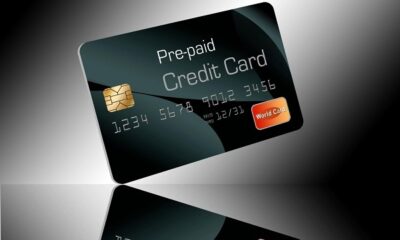Finance
What Millenials Need To Know Before Getting A Credit Card

Credit cards can be handy when used responsibly. For young Americans, understanding the basics of credit cards and how to use them wisely can prevent them from falling into credit card debt.
Credit cards have the potential to conveniently manage your finances, earn reward points, and even build your credit rating. But for a lot of young people, they can also cause a lot of damage. Since credit cards fail to come with a list of do’s and don’ts, young people are vulnerable to trial-by-error. To avoid serious money troubles, young people can take the following information in order to get all the benefits of a credit card without the crippling debt.
How do credit cards work?
A credit card allows you to spend money on credit. This credit is lent by the bank or financial institution that issued your credit card. When you purchase something, you can pay for it later. The bank lends you the funds and effectively pays for your item bought on credit, leaving you to pay back the bank at a later date.
This can be helpful for emergency purposes where you need to buy something straight away but won’t have the money until your next paycheck. You can use your credit card to purchase last-minute textbooks for university or if your car requires urgent repairs. By putting these types of things on credit, you can cover the costs instantly without having to pay back until your repayment is due at the end of the month.
Young people may need a credit card for security purposes — a credit card can be quickly frozen if your wallet is lost, for example. Or as a way to start building their credit score. With demonstrated responsible use of credit cards, young people can increase their chances of being approved for a home loan or attracting lower interest fees on personal loans.
How to make a credit card work for you?
It can be easy to attract credit card debt, high-interest rates, and a bad credit score if you don’t use your credit card correctly. Statistics reveal that credit card debt is the most common type of debt, accounting for 52% of debt consolidation cases. Before getting a credit card, consider the following tips:
1. Pay your balance in full each month
Always pay as much as you can each month. On your credit card statement, you will notice multiple payment options. These include:
- Minimum payment: Also referred to as the amount due, this is the smallest amount you can pay back without incurring a fee.
- Statement balance: This is the total amount you owe. If you pay the statement balance in full, you won’t have to pay any interest charges.
While it’s fine to simply meet the minimum payment, paying off the entire balance each month should be your goal. By paying only the minimum, it could take years to pay off your credit card balance which can result in costly interest charges and
2. Don’t max out your credit card
Maxing out your credit card balance is never a good idea. Doing so can damage your credit score and put you at risk for over-the-limit fees and penalty interest rates. It’s recommended to not use more than 20% to 30% of your available credit at any given time. Try to track your credit card charges throughout the month and stay within your credit limit. This will help you maintain a good credit rating and leaves you with enough credit if you’re in need of emergency funds.
3. Understand the terms of your credit card
The more you know about your credit card and its benefits, the more you’ll get out of it. While some of your credit card’s terms and perks are highlighted on the issuer’s website, many are hidden in the fine print.
Researching terms such as how your credit card company handles late repayments, interest rates, rewards programs, insurance covers, and extra features or fees can help you to become more aware of your credit card use and allow you to use it more cautiously. For beginners, it’s best to choose a low-interest credit card or a no annual fee credit card. There are also cards available that are suited to low incomes and feature a low credit limit, as well as student credit cards which generally have lower annual fees and interest rates.
4. Canceling your credit card
Canceling a credit card when you decide you don’t need it may seem like a logical thing to do, but it can get you into trouble. Depending on how old your credit card is, canceling, or closing it can end up damaging your credit score. It’s best to leave credit card accounts open until you are sure that closing the card won’t damage your credit score.
Summing up
It’s not unusual to hear credit card horror stories from young people, many of whom have had to spend years consolidating the debts that they racked up. To avoid going into credit card debt or serious money issues, knowing the pitfalls of credit cards before purchasing one is crucial.
It is also important to have a basic sense of how credit cards work to enjoy its benefits and avoid common credit card mistakes such as late payments and maxing out. Using your first credit card correctly will help save you money and build up a good credit score for future investments.









